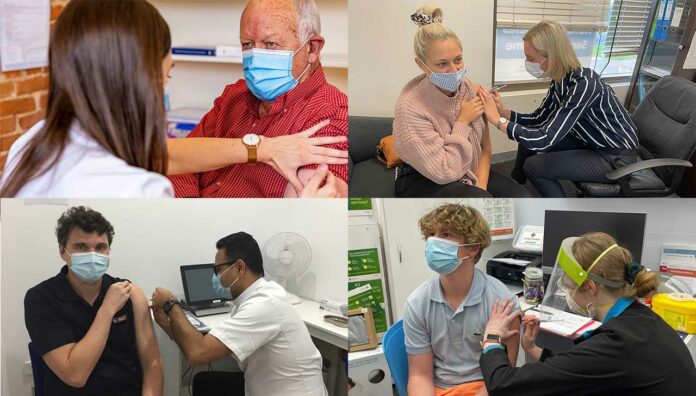More than 4 million COVID-19 vaccine doses have now been administered in community pharmacies, including 447,879 in the past 7 days, and 1 million in the past 3 weeks alone.
The immense contribution of community pharmacists to the national vaccine rollout comes as many in the profession across the country face unprecedented uncertainty, with reduced staff numbers, increased demand for vaccinations and shortages of rapid antigen tests (RATs).
As PSA renews its call for pharmacists to receive equal pay for COVID-19 vaccination services to those of other providers, at a press conference on Sunday, Federal Minister for Health Greg Hunt thanked pharmacists for their contribution to the vaccine rollout.
‘Throughout the last week, we’ve seen a series of record days for primary care and in particular for pharmacies in terms of vaccinations, so they’ve helped lift that vaccination rate,’ he said.
‘They’re doing an amazing job.’
Minister Hunt also praised the work of pharmacists in the booster program, with more than 52% of eligible Australians having received a booster dose.
From 31 January, the interval between a person’s primary course of vaccination and their booster will reduce to 3 months. This change will take effect even earlier in NSW, from 21 January. This will mean another 16 million Australians will be eligible for a booster dose.
After a fee increase in December, pharmacies now receive $26 for administering booster vaccinations.
The PSA’s National President Associate Professor Chris Freeman said PSA had been fighting to ensure the service did not run at a loss.
Unfair disparity in rates of remuneration for community pharmacies versus other vaccination providers still remains, he said on Wednesday.
‘Now that we’ve seen what can be achieved with better resourcing, it is time to remunerate pharmacists fairly and equally for their work.
‘This is critical to keeping the vaccine rollout program on track, particularly in relation to childhood vaccines, where they have reverted back very low payments for pharmacists. Subsequently, only half of the pharmacy network has opted to provide immunisations to this group.
‘Without fair and equitable remuneration for the administration of all COVID-19 vaccines, the Government risks having the paediatric vaccination program fall behind,’ he warned.
By the numbers
Source: www.health.gov.au/health-alerts/covid-19/case-numbers-and-statistics |
Close contact changes
Last week, National Cabinet agreed to expand the list of essential workers exempt from close contact quarantine requirements.
Changes will be made ‘as soon as possible’ to essential workers in transport, freight, logistics and service stations. This will be followed by the health sector, including those involved in the ‘production and provision of medical, pharmaceutical and health supplies and pharmacy workers’.
A close contact is someone who:
- lives in the same house as someone who tests positive
- spent 4 hours or longer with someone in a home, or health or aged care environment
- is determined as one by their state or territory health department.
Under the new guidelines, essential workers who are considered a close contact but are asymptomatic will not have to isolate for the usual 7 days. They will be able to return to work after returning a negative RAT on day 1 and then every second day for a week.
Prime Minister Scott Morrison acknowledged the impact the required isolation of close contacts was having on critical sectors across the country.
‘Worker absenteeism due to symptomatic COVID-19 illness, identified asymptomatic infection and the required isolation of close contacts is impacting on critical supply sectors and supply chains across all states and territories,’ he said in a statement.
RAT payment
The program of free RATs for concession card holders will begin on Monday (24 January).
Card holders will be allowed up to 10 free tests from community pharmacies over a 3-month period, with no more than five per month.
Those eligible include people with a Pensioner Concession Card, Commonwealth Seniors Health Care Card, Department of Veterans’ Affairs Gold, White or Orange Card, Health Care Card or Low Income Health Card.
Community pharmacies will receive a set amount for the unit cost of the RATs. This will be $10 plus GST per test initially, with ongoing review of unit prices. For each supply transaction processed under this program, an administration fee of $4.30 per transaction will be reimbursed to the pharmacy.
In his announcement, the Prime Minister urged close contacts and anyone with COVID-19 symptoms to attend a state clinic for free testing, rather than presenting to a pharmacy.
A/Prof Freeman welcomed the provision of some free RATs for people on low incomes to follow health advice and test themselves.
‘I do remain concerned about the solution, of which the details are still yet to be fully worked through,’ he said.
‘That pharmacists will need to secure their own stock for the tests to be supplied from 24 January is concerning, particularly as the profession must continuously deal with stressed patients desperate to access RATs and do the right thing to protect themselves and their vulnerable family members.’



 Dr Peter Tenni[/caption]
Dr Peter Tenni[/caption]
 How should we deprescribe gabapentinoids, according to the Maudsley Deprescribing Guidelines[/caption]
How should we deprescribe gabapentinoids, according to the Maudsley Deprescribing Guidelines[/caption]



 Pharmacists have always prescribed, but they have the potential to prescribe much more
Pharmacists have always prescribed, but they have the potential to prescribe much more





